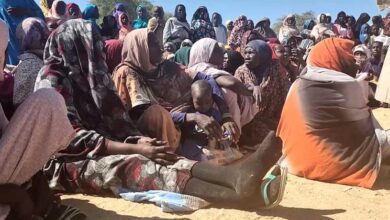Situation in southern Gaza ‘horrifying and apocalyptic’: WFP

Matthew Hollingsworth, WFP The National Director for Palestine, warned that with limited access to the south “we will certainly see what we saw happen in the north in the first months of the war”.
Mr. Hollingsworth recently spent 10 days in Gaza. Speaking from Jerusalem, he told journalists in New York that people in the area were “really exhausted.”

Matthew Hollingworth, World Food Program (WFP) Country Director for Palestine
The “evacuation” was horrifying
He said the “exodus” from Rafah over the past 20 days “has been a terrible and horrifying experience for so many people.” Most had been displaced multiple times and thought they would stay in a safe area for the remainder of the war. war.
They have fled to areas with insufficient clean water, medical supplies and support, limited food supplies and telecommunications outages.
“The public health concern has gone beyond crisis level,” he said, and “the sounds, the smells, the daily life are horrifying and apocalyptic.”
“People sleep to the sound of bombs, they sleep to the sound of drones, they sleep to the sounds of war as tanks enter the central areas of Rafah, which is just kilometers away. And they wake up to the same sounds.”
Huge need
Meanwhile, humanitarians have seen the amount of aid arriving dwindle and WFP bakeries in Rafah have closed due to lack of fuel and supplies.
He said that from May 7 to 20, “not a single WFP truck traveled from the southern corridor from Egypt to Rafah”.
The UN agency cannot reach its main warehouse in the south because it is in an evacuation zone and the 2,700 tons of food inside were looted or destroyed in the fighting.
“We are living and working precariously in the south,” he said, adding that some aid partners were able to provide hot meals in Rafah.
“Currently, we serve about 27,000 people, but that is not enough in Rafah and we are trying our best to support people in central areas, especially in Al Mawasi, which is close to a Millions of people fled to this great migration.”
WFP and its partners are able to provide about 400,000 hot meals a day to people in the Central Gaza region, but again supplies are limited.
The situation in the north
Mr Hollingsworth also mentioned the situation in northern Gaza, which he said had improved following the opening of two border crossings. United Nations agencies have previously warned of impending famine in the region.
“We are really seeing the results of what can happen when there is the will to provide adequate levels of aid,” he said.
About 12,000 tons of inter-agency aid, mostly food, has come in since May 1, “and the north looks very different because of it.”
The WFP official stressed the need for a ceasefire and the release of all hostages, noting that previous calls had gone unheard.
“We’re tired. People are tired. “We desperately need to start helping people get through this day-to-day life and try to survive,” he said. And to do that, there must be a ceasefire.”




